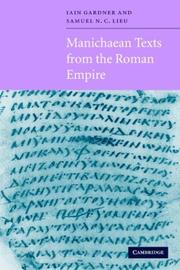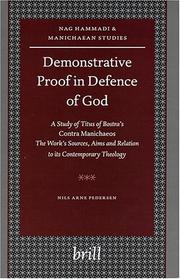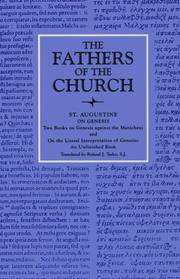| Listing 1 - 10 of 13 | << page >> |
Sort by
|

ISBN: 0521568226 052156090X 0511210515 9780511210518 9780521560900 9780521568227 0511215886 9780511215889 0511212283 9780511212284 051121409X 9780511214097 9780511616891 0511616899 1280515902 9781280515903 9786610515905 6610515905 1107141958 0511314892 Year: 2004 Publisher: Cambridge: Cambridge university press,
Abstract | Keywords | Export | Availability | Bookmark
 Loading...
Loading...Choose an application
- Reference Manager
- EndNote
- RefWorks (Direct export to RefWorks)
Founded by Mani (c. AD 216-276), a Syrian visionary of Judaeo-Christian background who lived in Persian Mesopotamia, Manichaeism spread rapidly into the Roman Empire in the third and fourth centuries AD and became one of the most persecuted heresies under Christian Roman emperors. The religion established missionary cells in Syria, Egypt, North Africa and Rome and has in Augustine of Hippo the most famous of its converts. The study of the religion in the Roman Empire has benefited from discoveries of genuine Manichaean texts from Medinet Madi and from the Dakhleh Oasis in Egypt, as well as successful decipherment of the Cologne Mani-Codex which gives an autobiography of the founder in Greek. This 2004 book is a single-volume collection of sources for this religion, and draws from material mostly unknown to English-speaking scholars and students, offers in translation genuine Manichaean texts from Greek, Latin and Coptic.
Manichaeism --- Manichéisme --- Rome --- Religion. --- Religion --- 273.21 --- Manicheïsme --- 273.21 Manicheïsme --- Manichéisme --- Dualism (Religion) --- Philosophy, Ancient --- Christianity --- Arts and Humanities --- History --- Manichaeism - Rome --- Rome - Religion
Book
ISSN: 09292470 ISBN: 9789004172852 9004172858 9786612400797 1282400797 9047426320 9789047426325 Year: 2009 Volume: 64 Publisher: Leiden Brill
Abstract | Keywords | Export | Availability | Bookmark
 Loading...
Loading...Choose an application
- Reference Manager
- EndNote
- RefWorks (Direct export to RefWorks)
New Light on Manichaeism provides the latest discoveries and insights into the Manichaean religion throughout its more than one thousand year history, ranging from glimpses into the life and thought of Mani himself, to developments in doctrine and practice in the religion's North African, Iranian, Central Asian, and Chinese settings. The volume includes contributions from the leading scholars in the field, offering new reconstructions of Manichaean literary and artistic productions, and innovative analyses of the religious, social, and political dynamics that shaped the rise and fall of this world religion.
Manichaeism --- 273.21 --- 273.21 Manicheïsme --- Manicheïsme --- Dualism (Religion) --- Philosophy, Ancient --- Christianity --- Conferences - Meetings --- Manichéisme --- Congresses. --- Congrès --- Manichaeism - Congresses
Book
ISSN: 09292470 ISBN: 9789004209121 9004209123 9789004308947 9004308946 Year: 2015 Volume: 90 Publisher: Leiden Brill
Abstract | Keywords | Export | Availability | Bookmark
 Loading...
Loading...Choose an application
- Reference Manager
- EndNote
- RefWorks (Direct export to RefWorks)
The founder of Manichaeism, Mani (216-274/277 CE), not only wrote down his teachings to prevent their adulteration, but also created a set of paintings—the Book of Pictures —to be used in the context of oral instruction. That pictorial handscroll and its later editions became canonical art for Mani's followers for a millennium afterwards. This richly illustrated study systematically explores the artistic culture of religious instruction of the Manichaeans based on textual and artistic evidence. It discusses the doctrinal themes (soteriology, prophetology, theology, and cosmology) depicted in Mani’s canonical pictures. Moreover, it identifies 10th-century fragments of canonical picture books, as well as select didactic images adapted to other, non-canonical art objects (murals, hanging scrolls, mortuary banners, and illuminated liturgical manuscripts) in Uygur Central Asia and Tang-Ming China.
Art, Manichaean --- Mani, --- 273.21 --- 273.21 Manicheïsme --- Manicheïsme --- Mani, - active 3rd century. - Aržang --- Art, Manichaean. --- Manichaean art --- Art manichéen.
Book
ISSN: 09292470 ISBN: 1282951440 9786612951442 9004180907 9789004180901 9789004180345 9004180346 Year: 2010 Volume: 70 Publisher: Leiden Brill
Abstract | Keywords | Export | Availability | Bookmark
 Loading...
Loading...Choose an application
- Reference Manager
- EndNote
- RefWorks (Direct export to RefWorks)
The use and appreciation of Scripture by the Manichaeans is a field of research with many unanswered questions. This study offers an investigation into the role of the Bible in the writings of the important Manichaean missionary Addas Adimantus (flor. circa 250 CE), one of Mani's first disciples. A major part of the book is dedicated to the reconstruction of the contents of his Disputationes, in which writing Adimantus attempted to demonstrate that the Old and New Testaments are absolutely irreconcilable. The most important source in this connection is Augustine, who refuted a Latin translation of Adimantus’ work. A thorough analysis of the contents of the Disputationes brings to the fore that Adimantus was a Marcionite prior to his going over to Mani’s church.
Manichaeism. --- Dualism (Religion) --- Philosophy, Ancient --- Christianity --- Augustine, --- Bible --- Criticism, interpretation, etc. --- Manichaeism --- 273.21 --- 273.21 Manicheïsme --- Manicheïsme --- Biblia --- Augustine, - Saint, Bishop of Hippo. - Contra Adimantum.

ISBN: 9004138838 9786610915231 9047405455 1280915234 142940812X 9789004138834 9781429408127 Year: 2004 Volume: 56 Publisher: Leiden Brill
Abstract | Keywords | Export | Availability | Bookmark
 Loading...
Loading...Choose an application
- Reference Manager
- EndNote
- RefWorks (Direct export to RefWorks)
This volume is the first extensive study of a Christian work from the 4th century, Titus of Bostra's Contra Manichaeos , which is the only text from the early Greek Church setting out a comprehensive theodicy. The study illuminates the text's relation to contemporary theology and philosophy and interprets it in the light of the ideological conflicts between pagans, Catholic Christians and Manichaeans in the 4th century. It includes an examination of the possible Manichaean sources used by Titus, and, furthermore, a critical text study and translation of central passages in Contra Manichaeos , based both on the Greek text and the Syriac version of it.
Manichaeism --- Controversial literature --- History and criticism --- Titus, --- 276 =75 TITUS BOSTRENSIS --- 273.21 --- 273.21 Manicheïsme --- Manicheïsme --- Griekse patrologie--TITUS BOSTRENSIS --- Dualism (Religion) --- Philosophy, Ancient --- Controversial literature&delete& --- Christianity --- Titus of Bostra --- Manichaeism - Controversial literature - History and criticism --- Titus, - of Bostra, Bishop of Bostra, - fl. ca. 362-378. - Against the Manichees --- History and criticism.
Book
ISSN: 09292470 ISBN: 9789004174368 9004174362 9786612401015 1282401017 9047427823 9789047427827 9781282401013 661240101X Year: 2009 Volume: 66 Publisher: Leiden Brill
Abstract | Keywords | Export | Availability | Bookmark
 Loading...
Loading...Choose an application
- Reference Manager
- EndNote
- RefWorks (Direct export to RefWorks)
Discovered in 1929, the Manichaean Kephalaia have opened up an important window on the early development of Manichaean doctrine. This study identifies a significant redactional tendency whereby the compilers of the text sought to clarify ambiguities in “canonical” Manichaean tradition by means of five-part numerical series. This discovery challenges the conventional wisdom of Manichaean scholarship, which has long maintained that, since Mani recorded his own teachings in a series of what later became canonical writings, Manichaean doctrines were transmitted relatively unchanged from the master to successive generations of disciples. Since this assumption is now called into question, it now becomes necessary to re-evaluate received notions about the shape of both the Manichaean “canon” and “tradition.”
Manichaeism --- Manichaeism. --- 273.21 --- 273.21 Manicheïsme --- Manicheïsme --- Dualism (Religion) --- Philosophy, Ancient --- Christianity --- Symbolism of numbers. --- Five (The number) in literature. --- Manichéisme --- Symbolisme des nombres --- Cinq (Le nombre) dans la littérature --- Kephalaia. --- Five (The number) in literature --- Symbolism of numbers --- Number symbolism --- Sacred numbers --- Symbolic numbers --- Numerals
Book
ISSN: 09292470 ISBN: 9789004254770 9789004255067 9004255060 9004254773 1299829708 Year: 2013 Volume: 83 Publisher: Leiden Brill
Abstract | Keywords | Export | Availability | Bookmark
 Loading...
Loading...Choose an application
- Reference Manager
- EndNote
- RefWorks (Direct export to RefWorks)
Based on several newly discovered texts, Augustine and Manichaean Christianity provides groundbreaking discussions of the relationship between the most influential church father of the West and the religion of his formative years. Augustine’s connection with Manichaean Christians was not only intense, but also enduring. This book unearths the essential background of writings such as Augustine’s Confessiones , De ordine and De vera religione , and discloses many a hidden Manichaean source of his powerful concepts of memory and the vision of God. Contributions by, among others, Iain Gardner, Therese Fuhrer, Jason BeDuhn, Majella Franzmann, Josef Lössl, Annemaré Kotzé and Nils Arne Pedersen.
Manichaeism --- Christianity and other religions --- Saint Augustin, --- Christianisme --- --Religions --- --Manichéisme --- --Colloque --- --2012 --- --Pretoria --- --actes --- --Manichaeism --- Augustine, --- 276 =71 AUGUSTINUS <063> --- 273.21 --- Dualism (Religion) --- Philosophy, Ancient --- Latijnse patrologie--Congressen--AUGUSTINUS --- Manicheïsme --- Christianity --- Avgustin, Blazhennyĭ, --- Augustinus, Aurelius, --- Augustyn, --- Augustin, --- Ughasṭīnūs, --- Agostino, --- Agustí, --- Augoustinos, --- Agostino di Tagaste, --- Aurelius Augustinus, --- Augustinus, --- Agostino d'Ippona, --- Agustín, --- Aurelio Agostino, --- Episkopos Ippōnos Augoustinos --- Augoustinos Ipponos --- Agostinho, --- Aurelli Augustini, --- Augustini, Aurelli, --- Aurelii Augustini, --- Augustini, Aurelii, --- Ōgostinos, --- Agostino, Aurelio, --- אוגוסטינוס הקדוש --- أغسطينوس، --- 奥古斯丁 --- Agustín de Hipona --- San Agustín --- Augustin d'Hippone --- Pseudo-Augustinus --- Conferences - Meetings --- 273.21 Manicheïsme --- Episkopos Ippōnos Augoustinos, --- Augoustinos Ipponos, --- --2012, --- Pretoria --- Avgustin, --- Augustinus, Aurelius --- Agostinho --- Augustine of Hippo --- Augustine d'Hippone --- Agostino d'Ippona --- Augustinus Hipponensis, sanctus --- Sant'Agostino --- Augustinus van Hippo --- Aurelius Augustinus --- Aurelio Agostino --- 聖アウグスティヌス --- アウグスティヌス --- Augustine --- Manichaeism - Congresses --- Christianity and other religions - Manichaeism - Congresses --- Religions --- Manichéisme --- Colloque --- Augustine, - Saint, Bishop of Hippo - Congresses --- Saint Augustin, 354-430 --- Augustine, - Saint, Bishop of Hippo
Book
ISSN: 09292470 ISBN: 9789004181410 9004181415 9789004181403 9004181407 1282952250 9781282952256 9786612952258 Year: 2009 Volume: 71 Publisher: Leiden Brill
Abstract | Keywords | Export | Availability | Bookmark
 Loading...
Loading...Choose an application
- Reference Manager
- EndNote
- RefWorks (Direct export to RefWorks)
This book contains the proceedings from the Codex Judas Congress, the first international conference held to discuss the newly-restored Tchacos Codex. Given that the Tchacos Codex is a newly-conserved ancient book of Christian manuscripts which had yet to be discussed collaboratively by a body of scholars, the research conducted and published within this book by the members of the Codex Judas Congress is nothing less than a landmark in Gnostic studies. Scholars address issues of identity and community, portraits of Judas, astrological lore, salvation and praxis, text and intertext, and manuscript matters. Although the contributions show a variety of interpretations of the Tchacos texts, several points of agreement emerge, including the assessment that the Codex belonged to early Christians in conflict with other Christians who belonged to the apostolic or conventional church. Contributors include: Grant Adamson, Johanna Brankaer, Fernando Bermejo Rubio, Serge Cazelais, April D. DeConick, Ismo Dunderberg, Niclas Förster, Wolf-Peter Funk, Simon Gathercole, Matteo Grosso, Lance Jenott, Karen King, Nicola Denzey Lewis, Alastair Logan, Antti Marjanen, Marvin Meyer, Elaine Pagels, Birger A. Pearson, Pierluigi Piovanelli, James M. Robinson, Gesine Schenke Robinson, Kevin Sullivan, Franklin Trammel, Johannes van Oort, Bas van Os, Louis Painchaud, Tage Petersen, John D. Turner, and Gregor Wurst.
Gospel of Judas --- Codex Tchacos --- Criticism, interpretation, etc. --- 273.21 --- Manicheïsme --- -Codex Tchacos --- -Tchacos Codex --- Codex Judas --- Judas Codex --- Bible. --- Gospel of Judas Iscariot --- Peuaggelion Nioudas --- Secret book of Judas of Kerioth --- Secret Gospel of Judas of Kerioth --- -Criticism, interpretation, etc. --- -273.21 --- 273.21 Manicheïsme --- -Gospel of Judas --- -Gnosticism --- Judas Iscariot --- Judas Iscariote --- Yehudah ish-Ḳeriyot --- Giuda Iscariota --- Yahūdhā al-Iskhariyūṭī --- Judas Iskariot --- Iuda Iskariot --- Tchacos Codex --- Gnosticism --- Judasz Iskariota
Book
ISSN: 09292470 ISBN: 9789004368613 9004368612 9789004380264 9004380264 Year: 2019 Volume: 94 Publisher: Leiden ; Boston, Massachusetts : Brill,
Abstract | Keywords | Export | Availability | Bookmark
 Loading...
Loading...Choose an application
- Reference Manager
- EndNote
- RefWorks (Direct export to RefWorks)
L’Hymnaire manichéen chinois offre un ensemble de 25 hymnes destinées à la pratique de la religion manichéenne par la Section des Auditeurs. Mis au jour à Dunhuang (actuel Gansu) au début du 20ème siècle, après être resté enfoui dans une cache pendant quelque douze siècles, ce rouleau écrit en langue chinoise, comprend plusieurs hymnes transcrites de diverses langues courantes en Asie centrale à l’époque de sa rédaction. Cette traduction apporte une vision nouvelle de la Religion de Lumière, telle qu’elle se vit adoptée par les Chinois, ainsi que de l’ampleur du message du prophète iranien Mani (216-276), aspirant à une portée universelle et destiné à relier entre eux les hommes de tous horizons de par le monde, quelque soit leur origine, leur langue ou leur histoire.
Manichaeism --- Persian poetry --- Scrolls, Chinese --- Scrolls --- History and criticism. --- British Library --- Xia bu zan. --- 273.21 --- Manuscripts --- Chinese scrolls --- Persian literature --- Dualism (Religion) --- Philosophy, Ancient --- 273.21 Manicheïsme --- Manicheïsme --- History and criticism --- Christianity --- British Library. --- BL --- 下部讚 --- Xiabuzan --- British Museum --- B.L. (British Library) --- Great Britain. --- Sifriyah ha-Briṭit --- Ying-kuo tʻu shu kuan --- Da Ying tu shu guan --- 大英图书馆 --- Manuscrits de Dunhuang. --- British library --- Manuscrit. Ms. S. 2659.

ISBN: 0813211840 9780813211848 0813200849 9780813200842 9780813210889 0813210887 Year: 1991 Volume: 84 Publisher: Washington (D.C.): Catholic university of America press,
Abstract | Keywords | Export | Availability | Bookmark
 Loading...
Loading...Choose an application
- Reference Manager
- EndNote
- RefWorks (Direct export to RefWorks)
Manichaeism --- Dualism (Religion) --- Philosophy, Ancient --- Christianity --- Bible. --- Be-reshit (Book of the Old Testament) --- Bereshit (Book of the Old Testament) --- Bytie (Book of the Old Testament) --- Chʻangsegi (Book of the Old Testament) --- Genesis (Book of the Old Testament) --- Sifr al-Takwīn --- Takwīn (Book of the Old Testament) --- #GOSA:II.P.AU.2 --- #GROL:SEMI-276<08> Fath 84 --- 222.2 --- 273.21 --- 273.21 Manicheïsme --- Manicheïsme --- Genesis --- Manichaeism - Controversial literature - Early works to 1800.
| Listing 1 - 10 of 13 | << page >> |
Sort by
|

 Search
Search Feedback
Feedback About UniCat
About UniCat  Help
Help News
News